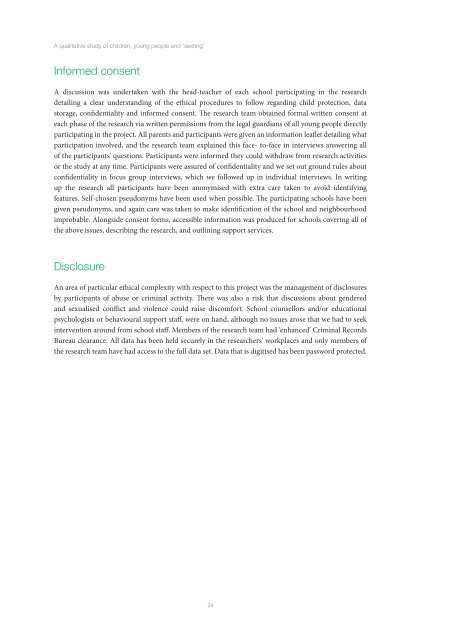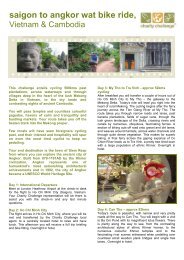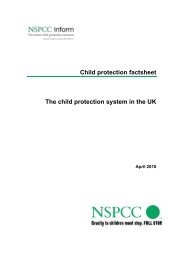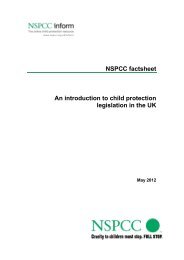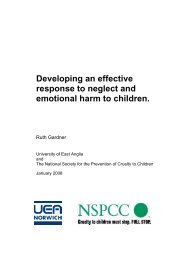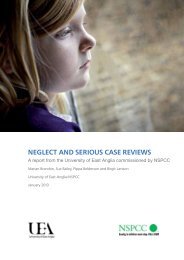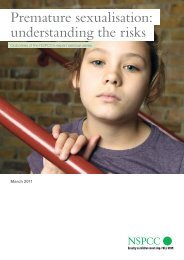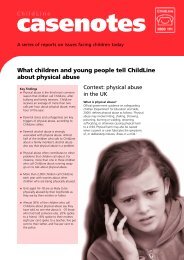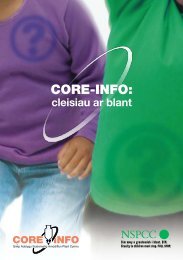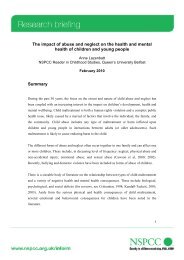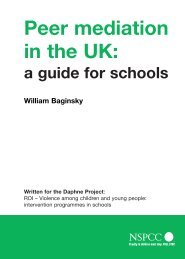A qualitative study of children, young people and 'sexting ... - NSPCC
A qualitative study of children, young people and 'sexting ... - NSPCC
A qualitative study of children, young people and 'sexting ... - NSPCC
You also want an ePaper? Increase the reach of your titles
YUMPU automatically turns print PDFs into web optimized ePapers that Google loves.
A <strong>qualitative</strong> <strong>study</strong> <strong>of</strong> <strong>children</strong>, <strong>young</strong> <strong>people</strong> <strong>and</strong> ‘sexting’<br />
informed consent<br />
A discussion was undertaken with the head-teacher <strong>of</strong> each school participating in the research<br />
detailing a clear underst<strong>and</strong>ing <strong>of</strong> the ethical procedures to follow regarding child protection, data<br />
storage, confidentiality <strong>and</strong> informed consent. The research team obtained formal written consent at<br />
each phase <strong>of</strong> the research via written permissions from the legal guardians <strong>of</strong> all <strong>young</strong> <strong>people</strong> directly<br />
participating in the project. All parents <strong>and</strong> participants were given an information leaflet detailing what<br />
participation involved, <strong>and</strong> the research team explained this face- to-face in interviews answering all<br />
<strong>of</strong> the participants’ questions. Participants were informed they could withdraw from research activities<br />
or the <strong>study</strong> at any time. Participants were assured <strong>of</strong> confidentiality <strong>and</strong> we set out ground rules about<br />
confidentiality in focus group interviews, which we followed up in individual interviews. In writing<br />
up the research all participants have been anonymised with extra care taken to avoid identifying<br />
features. Self-chosen pseudonyms have been used when possible. The participating schools have been<br />
given pseudonyms, <strong>and</strong> again care was taken to make identification <strong>of</strong> the school <strong>and</strong> neighbourhood<br />
improbable. Alongside consent forms, accessible information was produced for schools covering all <strong>of</strong><br />
the above issues, describing the research, <strong>and</strong> outlining support services.<br />
disclosure<br />
An area <strong>of</strong> particular ethical complexity with respect to this project was the management <strong>of</strong> disclosures<br />
by participants <strong>of</strong> abuse or criminal activity. There was also a risk that discussions about gendered<br />
<strong>and</strong> sexualised conflict <strong>and</strong> violence could raise discomfort. School counsellors <strong>and</strong>/or educational<br />
psychologists or behavioural support staff, were on h<strong>and</strong>, although no issues arose that we had to seek<br />
intervention around from school staff. Members <strong>of</strong> the research team had ‘enhanced’ Criminal Records<br />
Bureau clearance. All data has been held securely in the researchers’ workplaces <strong>and</strong> only members <strong>of</strong><br />
the research team have had access to the full data set. Data that is digitised has been password protected.<br />
24


